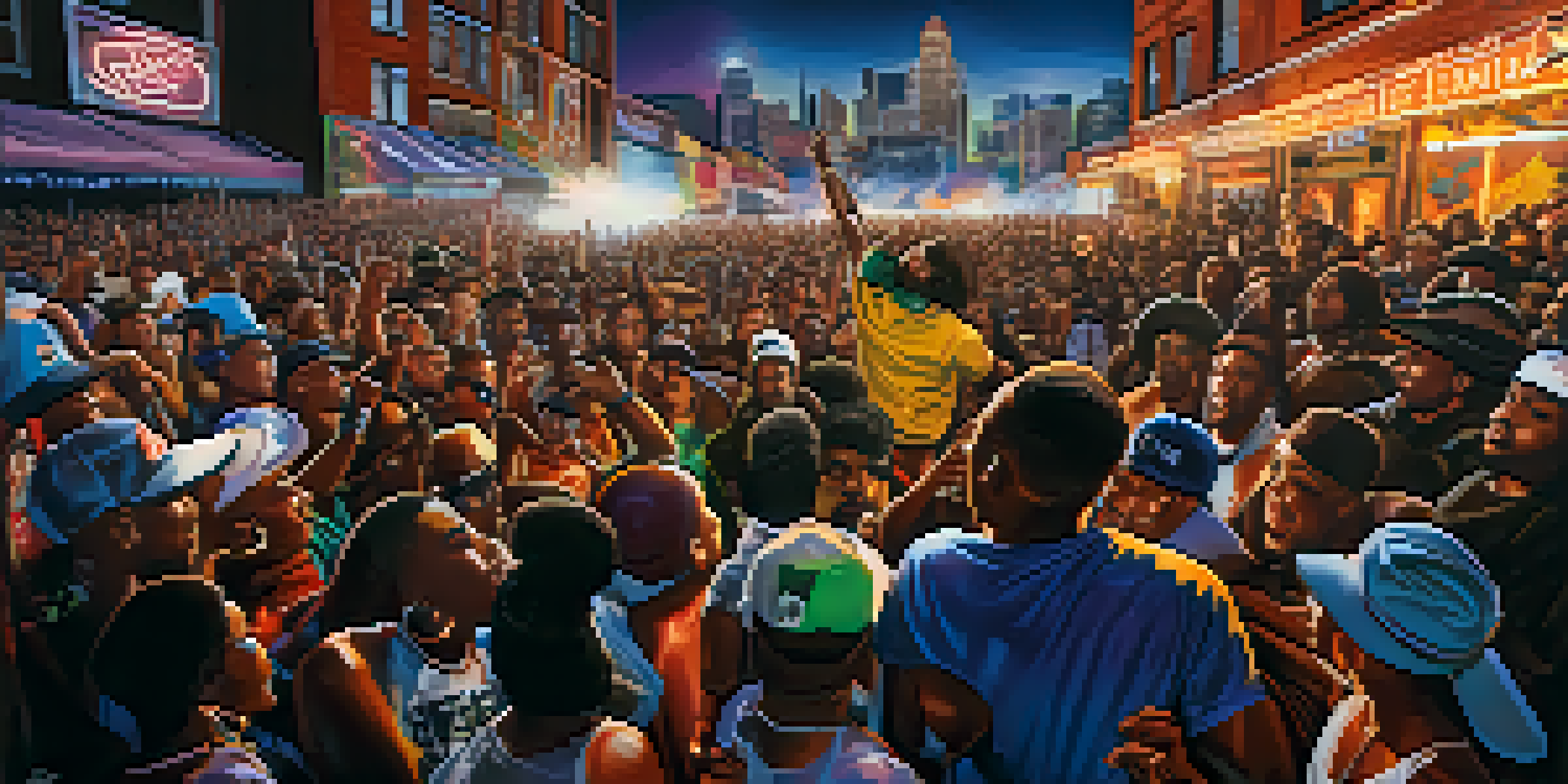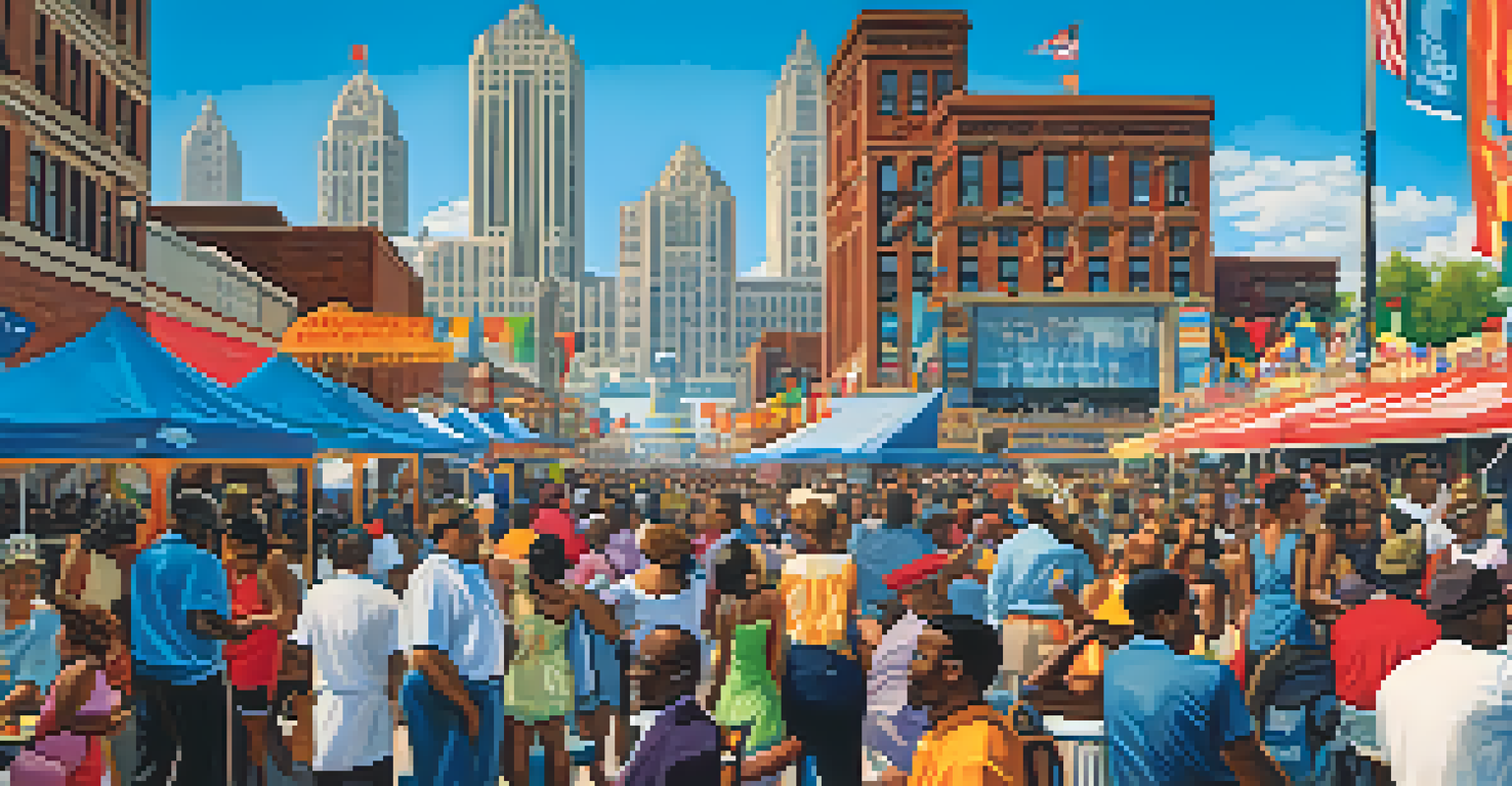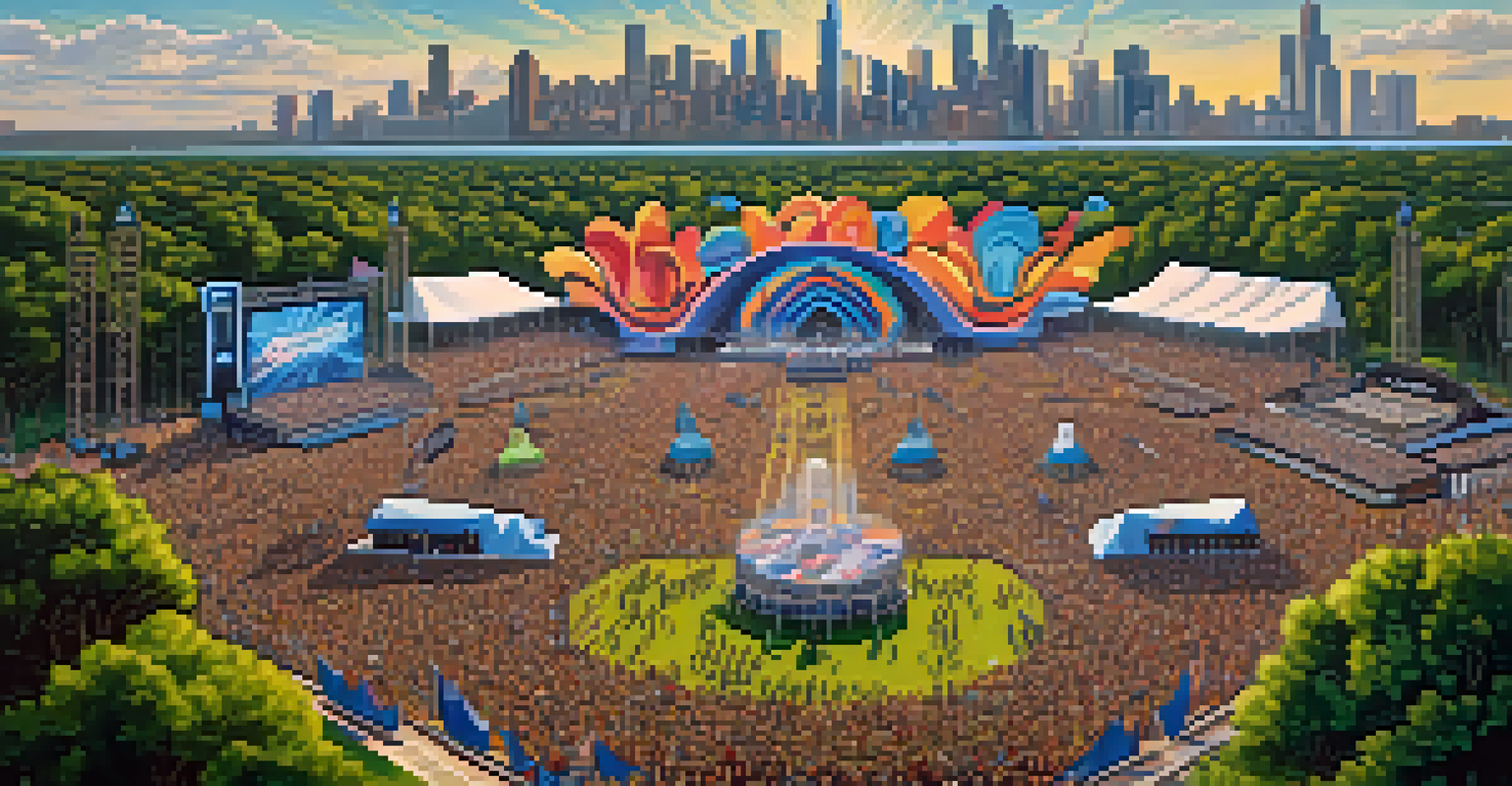From Jazz to Hip-Hop: Detroit's Diverse Musical Festivals

The Rich History of Detroit's Music Scene
Detroit's music scene is a tapestry woven with influences from various genres, especially jazz and hip-hop. The city's vibrant history began in the early 20th century, with jazz legends like Duke Ellington and Ella Fitzgerald gracing its stages. This rich musical heritage laid the groundwork for future generations, showcasing Detroit as a birthplace of innovation in sound.
Music can change the world because it can change people.
As the decades rolled on, the Motown sound emerged, blending rhythm and blues with pop, further cementing Detroit's reputation as a musical powerhouse. Artists like Stevie Wonder and Marvin Gaye captivated audiences, illustrating the city's ability to influence music far beyond its borders. This legacy continues to resonate today, inspiring new artists and genres that thrive in Detroit.
Today, Detroit is a melting pot of musical styles, celebrating its past while embracing new sounds. From jazz to techno and hip-hop, the city's festivals pay homage to its diverse musical roots, inviting locals and tourists alike to experience the rhythm and soul of Detroit. The evolution of its music scene is a testament to the city's resilience and creativity.
Detroit Jazz Festival: A Celebration of Sound
The Detroit Jazz Festival is one of the largest free jazz festivals in the world, attracting thousands of music lovers each year. Held annually over Labor Day weekend, this festival showcases both established legends and up-and-coming artists, creating a vibrant atmosphere filled with creativity. The festival's commitment to inclusivity makes it a hub for jazz enthusiasts of all ages and backgrounds.

Over the years, the festival has featured iconic performers like Herbie Hancock and Wynton Marsalis, ensuring that attendees experience the best of the jazz genre. With multiple stages set against the backdrop of the Detroit skyline, the festival creates a sensory feast that captivates audiences. Additionally, workshops and panels offer aspiring musicians a chance to learn from the masters, fostering the next generation of jazz talent.
Detroit's Music Scene is Diverse
The city's rich musical heritage spans jazz, hip-hop, and techno, showcasing its innovative spirit and cultural significance.
The festival not only celebrates music but also the community that surrounds it. Local food vendors, art installations, and family-friendly activities create an engaging environment that invites everyone to join in the festivities. The Detroit Jazz Festival exemplifies how music can unite people, making it a cherished event in the city's cultural calendar.
The Rise of Hip-Hop in Detroit's Music Festivals
In recent years, Detroit has become a significant player in the hip-hop scene, with festivals celebrating this dynamic genre. Events like the Detroit Hip-Hop Festival showcase local talent while also featuring national acts, fostering a sense of community and pride among artists and fans alike. This festival highlights the diverse voices within hip-hop, emphasizing its roots in social justice and storytelling.
The beautiful thing about music is that it connects people. It brings people together, regardless of their background.
The festival serves as a platform for emerging artists, giving them the opportunity to share their craft with a broader audience. Workshops and discussions centered around the hip-hop culture encourage collaboration and creativity, allowing participants to explore the genre's evolution. From DJs to spoken word artists, the festival embraces the multifaceted nature of hip-hop, making it accessible to all.
As hip-hop continues to grow in popularity, its impact on Detroit's cultural landscape is undeniable. The festival not only entertains but also educates attendees about the genre's history and its relevance in today's society. By celebrating hip-hop, Detroit reinforces its status as a city of innovation and artistic expression.
The Influence of Techno on Detroit's Festivals
Detroit is often hailed as the birthplace of techno music, and this genre has a significant presence in the city's festival scene. Events like Movement Electronic Music Festival celebrate techno's roots, attracting fans from around the globe. This festival not only showcases renowned DJs but also emphasizes the genre's cultural and historical significance in Detroit's rich musical tapestry.
Movement's lineup features both local and international artists, highlighting the global influence of Detroit's sound. The festival's vibrant atmosphere is characterized by immersive performances and cutting-edge visual displays, creating a unique experience for attendees. It's an opportunity to celebrate the city's contribution to electronic music and connect with fellow enthusiasts.
Festivals Boost Local Economy
Detroit's music festivals attract tourists, benefiting local businesses and supporting economic revitalization in the community.
Beyond the music, the festival fosters a sense of community among fans and artists alike. Workshops, discussions, and art installations encourage exploration and creativity, making it more than just a music festival. By embracing techno, Detroit solidifies its place as a city that continuously pushes the boundaries of musical innovation.
Community and Cultural Heritage at Music Festivals
Detroit's music festivals are more than just celebrations of sound; they serve as platforms for cultural expression and community engagement. Each festival reflects the unique heritage of the city, bringing together diverse groups to share their stories through music. This sense of belonging is vital in a city that has experienced economic challenges, as music fosters unity and resilience.
Local artists often participate in these festivals, showcasing their talents and connecting with their communities. This not only highlights the rich cultural tapestry of Detroit but also provides opportunities for collaboration and growth within the local music scene. The festivals become a celebration of identity, allowing artists to express themselves authentically while engaging with their audiences.
Moreover, these events often include initiatives that promote social change, addressing important issues through art. By using music as a vehicle for dialogue, Detroit's festivals encourage conversations about community, identity, and progress. In this way, the festivals not only entertain but also inspire, leaving a lasting impact on attendees and the city as a whole.
The Economic Impact of Music Festivals in Detroit
Detroit's music festivals contribute significantly to the local economy, attracting visitors and boosting tourism. As attendees flock to the city for events like the Detroit Jazz Festival and Movement, local businesses experience an influx of customers, from restaurants to hotels. This economic stimulation creates jobs and supports the livelihoods of many residents, showcasing the power of music as an economic driver.
Moreover, these festivals often collaborate with local vendors and artists, promoting a sense of community and supporting small businesses. This focus on local talent not only enhances the festival experience but also helps to sustain the cultural fabric of the city. By investing in local artists and businesses, the festivals play a crucial role in Detroit's economic revitalization.
Future Festivals Embrace Innovation
Upcoming festivals are set to enhance audience engagement through technology and a broader representation of musical genres.
The long-term benefits of these festivals extend beyond immediate economic gains. They help to position Detroit as a cultural destination, attracting more events and opportunities in the future. As the city's music scene continues to thrive, it paves the way for further growth and development, reinforcing Detroit's identity as a hub for creativity and innovation.
Future of Detroit's Musical Festivals: What Lies Ahead?
Looking ahead, Detroit's musical festivals are poised for exciting developments as the city continues to evolve. With a growing emphasis on diversity and inclusion, these events are likely to showcase a broader range of genres and artists. This commitment to representing various musical styles will enrich the festival experience and attract even more attendees.
Moreover, the integration of technology into these festivals could enhance the way audiences engage with music. From virtual reality experiences to live-streaming performances, the future holds endless possibilities for connecting fans with their favorite artists. This innovative approach will not only cater to local audiences but also reach global fans, expanding Detroit's musical influence.

As Detroit's music scene continues to flourish, so too will its festivals. They will remain vital in celebrating the city's rich cultural heritage while adapting to the ever-changing landscape of the music industry. The future looks bright for Detroit's musical festivals, promising unforgettable experiences for generations to come.